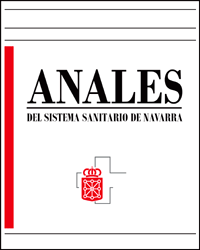Frequent users and difficult patients: How do they feel about their treatment by doctors?
Keywords:
Hiperfrecuentación. Relación médico-paciente. Satisfacción del paciente. Investigación cualitativa.Abstract
Background. To determine the opinions and expectations of difficult, frequent user, patients about their relationship with their GP. Material and methods. Qualitative design. Discussion groups. Invitation to a meeting at the Chantrea Health Centre (Pamplona). The participants were frequent users of the health centre in the year 2003, who had been defined as “difficult” – according to previously defined criteria – by each of the 12 doctors of the health centre. Excluded were patients with mental retardation, severe hearing problems, severe mental illness, difficulties in mobility and travelling, and over 70 years of age. Groups were formed from amongst the 112 preselected patients. Four groups were designed: “older” persons (GMA) of 46 to 70 years (14); “women” (GMU) of 31 to 45 years (14); “men” (GHO) of 31 to 45 years (13) and “youths” (GJO) of 16 to 30 years (12). The patients were invited by letter and by a subsequent telephone confirmation to a meeting, the content of which was not specified. Sessions of 2 hours duration were held with each of the groups formed. Audio recording, with prior authorisation, and verbatim transcription of sessions. Discussion and content analysis by the research group resulting in lines of consensus. Results. The three groups of older patients were formed with a total of 16 participants. The group of youths was not formed since the figure for attendance did not reach the number of 3 or more after three appointments. Conclusions. From the perspective of the patient it is very important that there should be efficient communication with the doctor. Awareness of a state of frequent use was not detected in those attending. They feel themselves to be chronic patients who need frequent attention. Satisfaction at the treatment received was observed as well as an understanding attitude towards the organisational limitations of the health centre. They did not give verbal expression to the existence of conflictive relations with their GPs.Downloads
Downloads
Published
How to Cite
Issue
Section
License
La revista Anales del Sistema Sanitario de Navarra es publicada por el Departamento de Salud del Gobierno de Navarra (España), quien conserva los derechos patrimoniales (copyright ) sobre el artículo publicado y favorece y permite la difusión del mismo bajo licencia Creative Commons Reconocimiento-CompartirIgual 4.0 Internacional (CC BY-SA 4.0). Esta licencia permite copiar, usar, difundir, transmitir y exponer públicamente el artículo, siempre que siempre que se cite la autoría y la publicación inicial en Anales del Sistema Sanitario de Navarra, y se distinga la existencia de esta licencia de uso.








